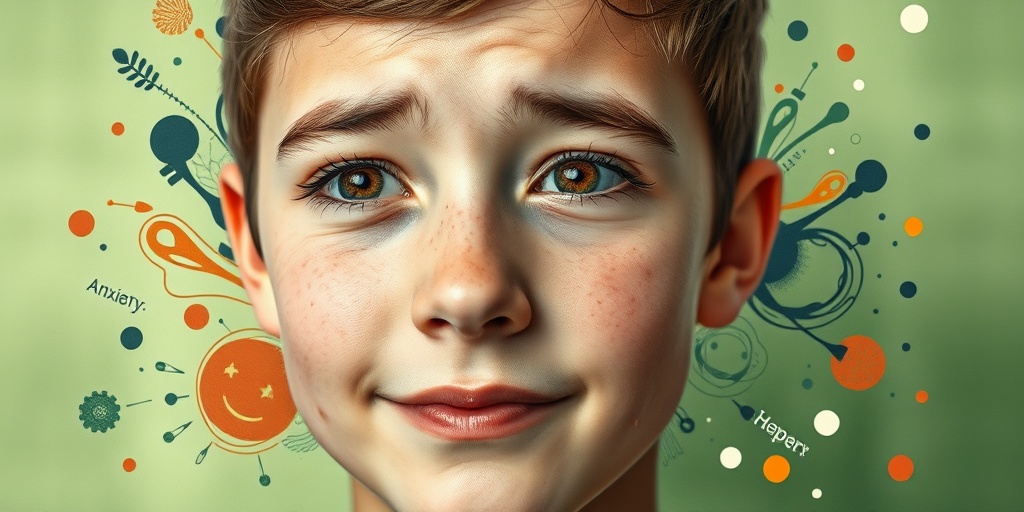What Is Teen Mental Health?
Teen mental health refers to the emotional, psychological, and social well-being of adolescents, typically aged between 13 and 19 years. During this critical developmental stage, teens experience a myriad of changes—physically, emotionally, and socially. Understanding teen mental health is essential as it lays the foundation for their future well-being and success.
The Importance of Mental Health in Teens
Just like adults, teens can face mental health challenges that affect their daily lives, relationships, and academic performance. Good mental health is crucial for teens as it influences their ability to cope with stress, build relationships, and make decisions. When mental health issues arise, they can lead to significant consequences, including poor academic performance, substance abuse, and even self-harm.
Factors Affecting Teen Mental Health
Several factors can impact the mental health of teens, including:
- Biological Factors: Genetics and brain chemistry can play a role in mental health.
- Environmental Factors: Family dynamics, school environment, and social interactions can influence mental well-being.
- Life Experiences: Trauma, bullying, and significant life changes can trigger mental health issues.
Recognizing the signs of mental health struggles in teens is vital for early intervention. Parents, educators, and peers should be aware of changes in behavior, mood swings, and withdrawal from social activities.
Common Mental Health Issues
Teens can experience a variety of mental health issues, some of which are more prevalent than others. Understanding these common conditions can help in identifying and addressing them effectively.
1. Anxiety Disorders
Anxiety disorders are among the most common mental health issues faced by teens. These can manifest as excessive worry, fear, or panic attacks. Symptoms may include:
- Restlessness or feeling on edge
- Difficulty concentrating
- Physical symptoms like rapid heartbeat or sweating
It’s essential for teens experiencing anxiety to seek support, as it can significantly impact their daily lives and relationships.
2. Depression
Depression is another prevalent issue among teens, characterized by persistent feelings of sadness, hopelessness, and a lack of interest in activities they once enjoyed. Signs of depression may include:
- Changes in appetite or sleep patterns
- Withdrawal from friends and family
- Difficulty in school or a decline in academic performance
Early intervention is crucial for teens struggling with depression, as it can lead to more severe issues if left unaddressed.
3. Eating Disorders
Eating disorders, such as anorexia nervosa and bulimia, often emerge during the teenage years. These disorders are characterized by unhealthy eating habits and a distorted body image. Symptoms can include:
- Extreme weight loss or fluctuations
- Preoccupation with food, dieting, and body shape
- Social withdrawal and secrecy around eating habits
Addressing eating disorders requires a comprehensive approach, including medical and psychological support.
4. Substance Abuse
Many teens may turn to drugs or alcohol as a coping mechanism for underlying mental health issues. Substance abuse can lead to a cycle of dependency and exacerbate existing mental health problems. Signs of substance abuse include:
- Changes in behavior or mood
- Decline in academic performance
- Neglecting responsibilities and relationships
It’s important for parents and guardians to maintain open lines of communication with their teens to help prevent substance abuse.
Seeking Help
If you or someone you know is struggling with mental health issues, it’s crucial to seek help. Resources like Yesil Health AI (yesilhealth.com) provide evidence-based health answers and can guide you toward appropriate support. Remember, mental health is just as important as physical health, and seeking help is a sign of strength. 💪
In conclusion, understanding teen mental health and recognizing common issues can empower parents, educators, and teens themselves to foster a supportive environment. By addressing these challenges early on, we can help teens navigate this critical stage of life with resilience and confidence. 🌟

Signs of Mental Health Struggles
Understanding the signs of mental health struggles in teens is crucial for early intervention and support. Adolescence is a time of significant change, and many teens may experience emotional ups and downs. However, when these feelings become overwhelming or persistent, it may indicate a deeper issue. Here are some common signs to watch for:
1. Changes in Mood
One of the most noticeable signs of mental health issues is a shift in mood. If a teen exhibits extreme mood swings, such as sudden irritability, sadness, or anxiety, it could be a sign of underlying mental health struggles. These mood changes may be accompanied by:
- Increased sensitivity to criticism
- Frequent crying spells
- Feelings of hopelessness
2. Withdrawal from Activities
When teens begin to withdraw from activities they once enjoyed, it can be a red flag. This withdrawal may manifest as:
- Avoiding social interactions with friends and family
- Loss of interest in hobbies or sports
- Declining academic performance
Such changes can indicate that a teen is struggling with their mental health and may need support.
3. Changes in Sleep Patterns
Sleep is vital for mental well-being, and changes in sleep patterns can signal mental health issues. Look for signs such as:
- Insomnia or difficulty falling asleep
- Oversleeping or excessive daytime sleepiness
- Frequent nightmares or disrupted sleep
These changes can affect a teen’s mood and overall functioning.
4. Changes in Appetite or Weight
Significant changes in appetite or weight can also be indicators of mental health struggles. This may include:
- Loss of appetite leading to weight loss
- Emotional eating resulting in weight gain
- Unexplained changes in eating habits
These changes can be linked to conditions such as depression or anxiety.
5. Increased Substance Use
Some teens may turn to alcohol or drugs as a coping mechanism for their mental health struggles. Signs of increased substance use include:
- Secretive behavior or lying about activities
- Declining academic performance
- Changes in friend groups
If you notice these behaviors, it’s essential to address them promptly.
Causes of Mental Health Problems
The causes of mental health problems in teens can be complex and multifaceted. Understanding these causes can help parents, educators, and peers provide better support. Here are some common factors that contribute to mental health issues:
1. Biological Factors
Genetics can play a significant role in mental health. If there is a family history of mental health disorders, teens may be at a higher risk. Additionally, hormonal changes during adolescence can impact mood and behavior.
2. Environmental Factors
The environment in which a teen grows up can significantly influence their mental health. Factors include:
- Family dynamics: High levels of conflict or lack of support can contribute to mental health struggles.
- School environment: Bullying, academic pressure, and social isolation can exacerbate mental health issues.
- Socioeconomic status: Financial stress can lead to anxiety and depression.
3. Trauma and Stress
Experiencing trauma, such as abuse, neglect, or the loss of a loved one, can have lasting effects on a teen’s mental health. Chronic stress from various sources, including family issues or academic pressure, can also contribute to mental health problems.
4. Social Media Influence
In today’s digital age, social media can significantly impact teens. While it can foster connections, it can also lead to:
- Comparison: Constantly comparing oneself to others can lead to feelings of inadequacy.
- Cyberbullying: Negative interactions online can harm self-esteem and mental health.
5. Lack of Coping Skills
Many teens lack effective coping mechanisms to deal with stress and emotional challenges. Teaching healthy coping strategies can be vital in preventing mental health issues.
Recognizing the signs and understanding the causes of mental health struggles in teens is essential for fostering a supportive environment. Early intervention can make a significant difference in a teen’s life. 🌟

Impact of Social Media
In today’s digital age, social media plays a significant role in the lives of teens. Platforms like Instagram, Snapchat, and TikTok are not just avenues for communication; they are also powerful tools that shape identity, influence behavior, and affect mental health. Understanding the impact of social media on teens is crucial for parents, educators, and the teens themselves.
Positive Aspects of Social Media
While there are concerns about social media, it also offers several benefits for teens:
- Connection and Community: Social media allows teens to connect with friends and family, fostering a sense of belonging. It can be especially beneficial for those who feel isolated or marginalized.
- Creativity and Self-Expression: Platforms like TikTok and Instagram provide a space for teens to express themselves creatively through videos, art, and writing.
- Access to Information: Social media is a powerful tool for learning. Teens can access educational content, stay informed about current events, and engage in discussions that broaden their perspectives.
Negative Effects of Social Media
Despite its advantages, social media can also have detrimental effects on teens:
- Cyberbullying: The anonymity of social media can lead to harmful behaviors, such as cyberbullying, which can have severe emotional consequences for victims.
- Comparison and Self-Esteem Issues: Constant exposure to curated images and lifestyles can lead teens to compare themselves unfavorably to others, resulting in low self-esteem and body image issues.
- Screen Time and Mental Health: Excessive use of social media can contribute to anxiety, depression, and sleep disturbances among teens.
Finding Balance
To mitigate the negative effects of social media, it’s essential for teens to find a healthy balance. Here are some tips:
- Set Time Limits: Encourage teens to limit their social media usage to avoid excessive screen time.
- Curate Content: Teach teens to follow accounts that promote positivity and self-acceptance.
- Engage in Offline Activities: Encourage participation in hobbies, sports, and face-to-face interactions to foster real-world connections.
Seeking Help and Support
As teens navigate the complexities of adolescence, seeking help and support is vital for their emotional and mental well-being. Whether they are dealing with academic pressure, social challenges, or mental health issues, knowing where to turn for assistance can make a significant difference.
Recognizing the Need for Help
It’s essential for teens to recognize when they need help. Signs may include:
- Changes in Mood: Persistent feelings of sadness, anxiety, or irritability.
- Withdrawal: Isolating themselves from friends and family.
- Declining Academic Performance: A noticeable drop in grades or loss of interest in school.
Where to Find Support
There are various resources available for teens seeking help:
- School Counselors: Many schools have counselors who can provide support and guidance.
- Hotlines: National hotlines offer confidential support for teens in crisis.
- Online Communities: Safe online forums can provide a sense of community and understanding.
Encouraging Open Communication
Parents and guardians play a crucial role in supporting teens. Encouraging open communication can help teens feel comfortable discussing their feelings and challenges. Here are some ways to foster this environment:
- Active Listening: Show genuine interest in what teens have to say without judgment.
- Validate Feelings: Acknowledge their emotions and experiences as real and important.
- Be Available: Make time for regular check-ins to discuss any issues or concerns.
By understanding the impact of social media and encouraging teens to seek help when needed, we can create a supportive environment that promotes their overall well-being. 🌟

Healthy Coping Strategies for Teens
Adolescence can be a challenging time filled with emotional ups and downs. As teens navigate through school, friendships, and family dynamics, it’s crucial for them to develop healthy coping strategies. These strategies can help manage stress, anxiety, and other emotional challenges that may arise during this pivotal stage of life.
Understanding Stress and Its Impact
Stress is a natural response to the demands of life, but when it becomes overwhelming, it can lead to negative consequences for mental health. For teens, stress can stem from various sources, including:
- Academic pressures
- Social dynamics and peer relationships
- Family expectations
- Personal identity exploration
Recognizing the signs of stress is the first step toward managing it effectively. Common signs include irritability, changes in sleep patterns, and difficulty concentrating. By implementing healthy coping strategies, teens can better navigate these challenges.
Healthy Coping Strategies
Here are some effective coping strategies that teens can adopt to manage stress and promote emotional well-being:
- Physical Activity: Engaging in regular exercise, whether it’s playing a sport, dancing, or simply going for a walk, can significantly reduce stress levels. Physical activity releases endorphins, which are natural mood lifters. 🏃♂️
- Mindfulness and Meditation: Practicing mindfulness techniques, such as meditation or deep breathing exercises, can help teens stay grounded and focused. These practices encourage self-awareness and can reduce anxiety. 🧘♀️
- Creative Outlets: Encouraging creative expression through art, music, or writing can provide a healthy way for teens to process their emotions. Creativity can be therapeutic and fulfilling. 🎨
- Social Support: Building a strong support network is essential. Teens should feel comfortable reaching out to friends, family, or mentors when they need someone to talk to. Sharing feelings can lighten the emotional load. 🤝
- Healthy Routines: Establishing a consistent daily routine that includes time for relaxation, hobbies, and self-care can help teens feel more in control and less overwhelmed.
Promoting Positive Mental Health in Teens
Positive mental health is vital for teens as they develop their identities and prepare for adulthood. Fostering an environment that supports mental well-being can make a significant difference in their lives.
Creating a Supportive Environment
Parents, educators, and peers play a crucial role in promoting positive mental health among teens. Here are some ways to create a supportive environment:
- Open Communication: Encourage open and honest conversations about feelings and mental health. Let teens know that it’s okay to express their emotions without fear of judgment.
- Education and Awareness: Educate teens about mental health issues and the importance of seeking help when needed. Awareness can reduce stigma and empower them to take charge of their mental well-being.
- Encouraging Healthy Habits: Promote healthy lifestyle choices, including balanced nutrition, regular exercise, and adequate sleep. These factors significantly impact mental health.
- Recognizing Achievements: Celebrate both small and big achievements. Acknowledging their efforts can boost self-esteem and motivate teens to continue striving for their goals.
Encouraging Resilience
Resilience is the ability to bounce back from challenges and setbacks. Teaching teens resilience skills can help them cope with life’s difficulties more effectively. Here are some strategies:
- Problem-Solving Skills: Encourage teens to approach problems with a solution-oriented mindset. Discussing potential solutions can empower them to tackle challenges head-on.
- Positive Self-Talk: Help teens develop a positive inner dialogue. Encouraging them to replace negative thoughts with affirmations can enhance their self-confidence.
- Setting Realistic Goals: Teach teens to set achievable goals and break them down into manageable steps. This approach can prevent feelings of overwhelm and promote a sense of accomplishment.
By implementing these strategies, we can help teens build a strong foundation for positive mental health, enabling them to thrive during their formative years and beyond. 🌟

Frequently Asked Questions about Teens
What are some common challenges faced by teens today?
Teens often encounter various challenges, including:
- Academic pressure: Balancing schoolwork and extracurricular activities can be overwhelming.
- Social dynamics: Navigating friendships and peer relationships can be complex.
- Identity exploration: Many teens are figuring out their personal identity and values.
- Mental health issues: Anxiety and depression are increasingly common among teens.
How can parents support their teens effectively?
Parents can play a crucial role in supporting their teens by:
- Maintaining open communication: Encourage honest discussions about feelings and experiences.
- Being involved: Attend school events and engage in their interests.
- Setting boundaries: Establish clear rules while allowing some independence.
- Promoting healthy habits: Encourage physical activity and balanced nutrition.
What activities are beneficial for teens?
Engaging in various activities can be beneficial for teens, such as:
- Sports: Participating in team sports can enhance physical health and teamwork skills.
- Arts and crafts: Creative activities can foster self-expression and relaxation.
- Volunteering: Helping others can build empathy and a sense of community.
- Clubs and organizations: Joining clubs can help teens develop new skills and friendships.
How can teens manage stress effectively?
Teens can manage stress through various strategies, including:
- Mindfulness and meditation: Practicing mindfulness can help reduce anxiety.
- Physical activity: Regular exercise is a great way to relieve stress.
- Time management: Prioritizing tasks can help reduce feelings of being overwhelmed.
- Seeking support: Talking to friends, family, or a counselor can provide relief.
What role does technology play in the lives of teens?
Technology significantly impacts teens in various ways:
- Social interaction: Social media platforms allow teens to connect with peers.
- Access to information: The internet provides a wealth of knowledge and resources.
- Entertainment: Video games and streaming services offer leisure activities.
- Potential risks: It’s essential to be aware of online safety and cyberbullying.
How can teens develop healthy relationships?
Building healthy relationships is vital for teens. Here are some tips:
- Communication: Encourage open and honest dialogue with friends and family.
- Respect: Teach the importance of respecting boundaries and differences.
- Conflict resolution: Help teens learn how to resolve disagreements constructively.
- Empathy: Encourage understanding and compassion towards others’ feelings.
What are some signs that a teen may need professional help?
Parents and guardians should be aware of the following signs:
- Withdrawal: A sudden loss of interest in activities they once enjoyed.
- Changes in mood: Frequent mood swings or persistent sadness.
- Academic decline: A noticeable drop in grades or school performance.
- Substance use: Experimenting with drugs or alcohol.
By understanding these aspects of teen life, parents and guardians can better support their teens through this critical developmental stage. 🌱




